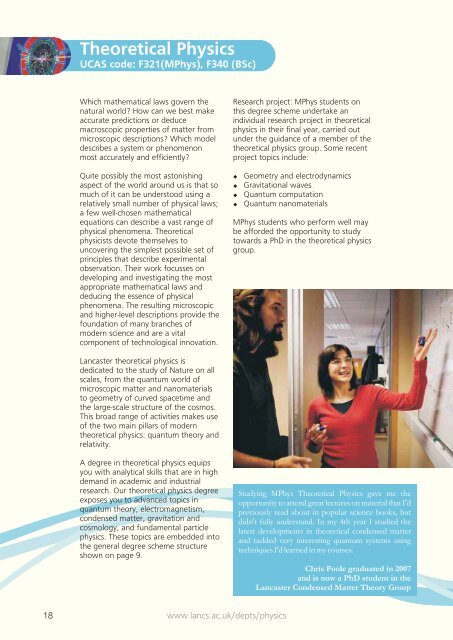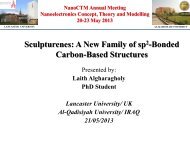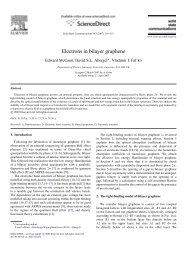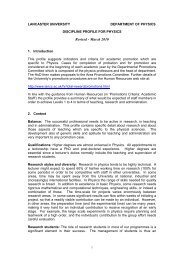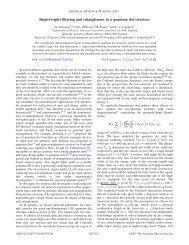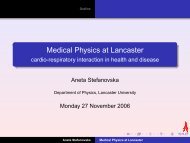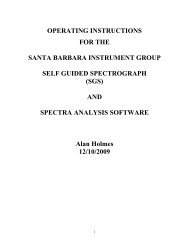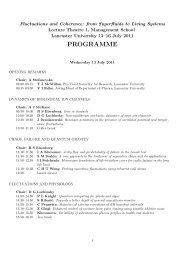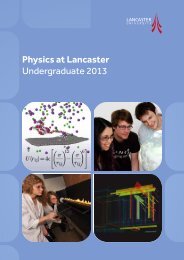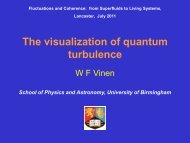Theoretical Physics - Physics at Lancaster University
Theoretical Physics - Physics at Lancaster University
Theoretical Physics - Physics at Lancaster University
Create successful ePaper yourself
Turn your PDF publications into a flip-book with our unique Google optimized e-Paper software.
<strong>Theoretical</strong> <strong>Physics</strong><br />
UCAS code: F321(MPhys), F340 (BSc)<br />
Which m<strong>at</strong>hem<strong>at</strong>ical laws govern the<br />
n<strong>at</strong>ural world? How can we best make<br />
accur<strong>at</strong>e predictions or deduce<br />
macroscopic properties of m<strong>at</strong>ter from<br />
microscopic descriptions? Which model<br />
describes a system or phenomenon<br />
most accur<strong>at</strong>ely and efficiently?<br />
Quite possibly the most astonishing<br />
aspect of the world around us is th<strong>at</strong> so<br />
much of it can be understood using a<br />
rel<strong>at</strong>ively small number of physical laws;<br />
a few well-chosen m<strong>at</strong>hem<strong>at</strong>ical<br />
equ<strong>at</strong>ions can describe a vast range of<br />
physical phenomena. <strong>Theoretical</strong><br />
physicists devote themselves to<br />
uncovering the simplest possible set of<br />
principles th<strong>at</strong> describe experimental<br />
observ<strong>at</strong>ion. Their work focusses on<br />
developing and investig<strong>at</strong>ing the most<br />
appropri<strong>at</strong>e m<strong>at</strong>hem<strong>at</strong>ical laws and<br />
deducing the essence of physical<br />
phenomena. The resulting microscopic<br />
and higher-level descriptions provide the<br />
found<strong>at</strong>ion of many branches of<br />
modern science and are a vital<br />
component of technological innov<strong>at</strong>ion.<br />
Research project: MPhys students on<br />
this degree scheme undertake an<br />
individual research project in theoretical<br />
physics in their final year, carried out<br />
under the guidance of a member of the<br />
theoretical physics group. Some recent<br />
project topics include:<br />
<br />
<br />
<br />
<br />
Geometry and electrodynamics<br />
Gravit<strong>at</strong>ional waves<br />
Quantum comput<strong>at</strong>ion<br />
Quantum nanom<strong>at</strong>erials<br />
MPhys students who perform well may<br />
be afforded the opportunity to study<br />
towards a PhD in the theoretical physics<br />
group.<br />
<strong>Lancaster</strong> theoretical physics is<br />
dedic<strong>at</strong>ed to the study of N<strong>at</strong>ure on all<br />
scales, from the quantum world of<br />
microscopic m<strong>at</strong>ter and nanom<strong>at</strong>erials<br />
to geometry of curved spacetime and<br />
the large-scale structure of the cosmos.<br />
This broad range of activities makes use<br />
of the two main pillars of modern<br />
theoretical physics: quantum theory and<br />
rel<strong>at</strong>ivity.<br />
A degree in theoretical physics equips<br />
you with analytical skills th<strong>at</strong> are in high<br />
demand in academic and industrial<br />
research. Our theoretical physics degree<br />
exposes you to advanced topics in<br />
quantum theory, electromagnetism,<br />
condensed m<strong>at</strong>ter, gravit<strong>at</strong>ion and<br />
cosmology, and fundamental particle<br />
physics. These topics are embedded into<br />
the general degree scheme structure<br />
shown on page 9.<br />
Studying MPhys <strong>Theoretical</strong> <strong>Physics</strong> gave me the<br />
opportunity to <strong>at</strong>tend gre<strong>at</strong> lectures on m<strong>at</strong>erial th<strong>at</strong> I'd<br />
previously read about in popular science books, but<br />
didn't fully understand. In my 4th year I studied the<br />
l<strong>at</strong>est developments in theoretical condensed m<strong>at</strong>ter<br />
and tackled very interesting quantum systems using<br />
techniques I'd learned in my courses.<br />
Chris Poole gradu<strong>at</strong>ed in 2007<br />
and is now a PhD student in the<br />
<strong>Lancaster</strong> Condensed M<strong>at</strong>ter Theory Group<br />
18 www.lancs.ac.uk/depts/physics


